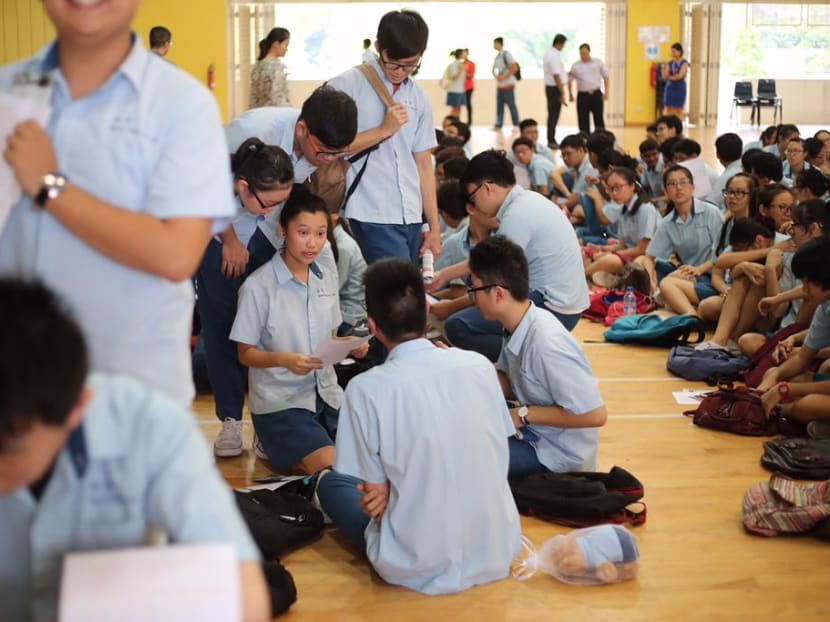3 in 4 Singapore students fear failure, higher than global average: OECD study
SINGAPORE — Singapore students are among those who are most afraid of failure, a study by the Organisation for Economic Cooperation and Development (OECD) has found.

In the OECD’s latest Programme for International Student Assessment (Pisa) test, 72 per cent of Singapore students said they worry about what others would think of them if they fail and 78 per cent said they would have doubts about their future if they were failing.
SINGAPORE — Singapore students are among those who are most afraid of failure, a study by the Organisation for Economic Cooperation and Development (OECD) has found.
In the OECD’s latest Programme for International Student Assessment (Pisa) test, Singapore has the highest percentage of students (78 per cent) agreeing or strongly agreeing with the phrase, “When I am failing, this makes me doubt my plans for the future”, when compared with those from other countries.
And 72 per cent of Singapore students said that they worry about what others would think of them if they fail — the ninth highest score among the economies studied.
Students in Taipei (89 per cent), Hong Kong (82 per cent) and Macau (80 per cent) resonated the most with this sentiment.
Singapore’s numbers are well above the result seen among the 37 OECD member countries, where 54 per cent of students on average agreed with the first statement and 56 per cent agreed with the second.
This was the first time that OECD measured a fear of failure in its Pisa test, which is done once every three years and also looks at how students around the world fare academically.
Singapore’s results are not ideal, as OECD said in its Pisa questionnaire framework that the “optimal learner is high in work mastery and low in fear of failure”.
The framework referenced research showing that a fear of failure causes students to be self-protective and avoid challenging situations and opportunities that are essential for learning and development.
In response to this finding, the Ministry of Education (MOE) said in a statement that it recognises that excessive fear can be disabling, although a rational and moderate sense of fear may motivate students to work hard and strive for better performance.
The ministry noted that across the 79 economies that took part in Pisa, students in higher-performing educational systems were more afraid of failure.
“This is congruent with research findings that a moderate amount of fear, taken in a positive spirit, can be productive and motivate students to work harder,” it said.
It also said that students here could have reflected more fear in Pisa because most of the 15-year-olds who did the survey in 2018 were in Secondary 4 and would be sitting for their GCE O- or N-Level exams at the end of that year.
“Their fears could stem from the desire to do well in national examinations,” MOE added.
Nonetheless, the ministry said that it would be building on existing efforts to help students develop a growth mindset and a resilience to bounce back from failure, and to view setbacks as opportunities to learn and grow.
Indeed, a “growth mindset” was one of the things that the OECD study measured. It found that Singapore students scored below the OECD average in this aspect as well.
About 60 per cent of Singapore students possess a growth mindset and believe that their intelligence is something that they can enhance, while the OECD average is 63 per cent.
MOE said it also plans to help students appreciate that there are multiple pathways and opportunities to pursue their passions and interests, and that academic performance alone does not define their self-worth or prospects in life.
The ministry said that it is already in the process of reducing students’ fear of failure, by encouraging students to move away from an overemphasis on academic results with the new Primary School Leaving Examination’s (PSLE's) scoring system.
In 2016, it announced that the aggregate score for the PSLE — a T-score that grades students very finely — will be replaced with wider scoring bands from 2021.
MOE said that the rollout of full subject-based banding and the removal of academic streams in secondary schools by 2024 will also help to encourage students here to adopt a growth mindset and take greater ownership of their learning.
Fear of failure was one of three achievement motives that were studied in Pisa. The other two were competitiveness, which the study defined as a desire to outperform others, and work mastery, a desire to work hard to master tasks.
In the competitiveness measure, 76 per cent of Singapore students said they felt it was true that students are competing against each other, while the OECD average is 50 per cent.
In terms of work mastery, 68.3 per cent of male Singapore students and 61 per cent of female Singapore students agreed or strongly agreed to this phrase, "If I am not good at something, I would rather keep struggling to master it than move on to something I may be good at".
The OECD average is 67.8 per cent among male students, and 65.7 per cent among female students.
Taken together, the indicators go towards assessing the personality-based context in which students approach or avoid learning.
“They are the result of a lifetime of socialisation from parents, teachers, coaches and one’s cultural surroundings, and they capture how behaviour is energised over time,” OECD said.











